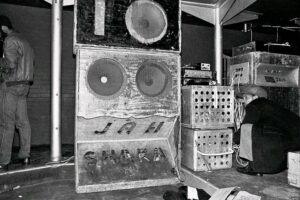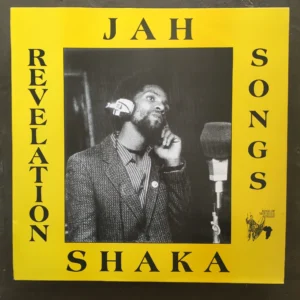SST Tribute to the Late Great Jah Shaka
“It came to a time which you would have known as the black consciousness era, people like Angela Davis were going around giving speeches, Martin Luther King, George Jackson, all those people. Well, the sound, Shaka sound, developed then. Because of our history and knowing that a main part of communication and unity is to have something which will unify the people. So from that time the sound name was chosen for the purpose of being able to unify the people. That’s the philosophy behind the sound, to be able to unify the people to do something for themselves.”
Jay Shaka interviewed by Penny Reel for Black Echoes in 1987.
Today, the SST team joins hearts with the worldwide sound system community mourning the loss of music producer, singer, activist and sound system operator Jah Shaka, who passed away yesterday April 13th, 2023 in London, UK.
The importance of Jah Shaka and his iconic sound system, which he operated for more than five decades, cannot be overestimated. With his deep and uncompromising Rastafari-inspired music selection, Jah Shaka inspired three generations of music producers, sound system operators, and music fans, and heavily contributed to turning reggae sound system culture into the global movement that it is today, inspiring in turn also our research project. His militant dub style as well as his sound system’s unique sonic signature influenced not only contemporary reggae and dub music but contributed to shape the wider British music soundscape from the early 90s until the present day, including post punk, jungle, UK garage, Black electronics and grime.

Jah Shaka sound system back in the days. Source: Jah Shaka Facebook page
Jah Shaka was born in the parish of Clarendon, Jamaica. Part of the Windrush Generation, he came with his parents to the UK at a very early age, settling in southeast London. He began his music career in the late 60s working with Lewisham sound system Freddie Cloudburst. Inspired spiritually by his interest in Rastafari, and politically by the American Civil Rights movement, he started to build his own sound, named after the great eighteenth-century Zulu king Shaka, the ‘Black Napoleon.’ By the late 1970s, Jah Shaka’s sound system had developed a cult following.
Whereas other sounds usually supported a team of selectors and DJs, Shaka performed all these functions alone, assistance in setting up the sound coming from a team of devoted youths for whom Shaka’s music was almost a way of life. His dances became famous for their spiritually charged atmosphere and the acrobatic, stylized dancing of the participants. In 1980, Shaka inaugurated his Jah Shaka King Of The Zulu Tribe label with the release of Jah Children Cry by African Princess. This was followed by the first instalment in his long-running Commandments Of Dub series. The label currently counts more than 100 releases including 7’’ and 12’’ singles as well as vocal and dub albums, and a huge amount of unreleased songs he used to play as dubplate and thus have achieved mythical status.

Jah Shaka’s first album as a singer, 1983
With the decline of interest in Rastafari-inspired roots music in the 80s, Shaka’s dances became more and more isolated affairs, the crowd thinning to a hardcore of older followers. However, Shaka’s adherence to Rasta, and the particular type of heavy, spiritual reggae his name has become synonymous with, remained unswerving. By the latter part of the decade a new, young, multiracial crowd of disaffected roots fans had begun to appear. Out of this crowd emerged a number of artists and sound systems that largely shunned contemporary reggae in favour of the revived sounds of the 70s and early 80s in which Shaka still specialised, often substituting real musicians with cutting edge electronic instrumentation. This ‘new dub school’, predominantly inspired by Shaka, includes premiere names such as the Disciples, Alpha and Omega, Bush Chemists, the Roots Man, Jah Warrior, Manasseh, and many others.

Jah Shaka playing his last gig in Paris in Aprile 2023. Image (c) Maxence Jah La Chorrera. Source: Jah Shaka Facebook page.
Laying the foundation of what is currently labelled ‘UK Dub’, the new generation of British born music producers and sound operators gained much support, nurturing and sustaining its own network of UK-based musicians, record labels, studios, sound systems, clubs and radio shows. This has in turn nurtured a further generation of roots and dub music producers and fans, this time literally spread across the whole globe, who continued to revere Jah Shaka as a pioneer and a founding figure. For his part, Jah Shaka untiringly continued to tour the world spreading Rastafari message of love, tolerance and spirituality until his very last days.
We send our deepest condolences to Jah Shaka’s family, his friends and colleagues. His legacy is truly tremendous and he will never be forgotten.
